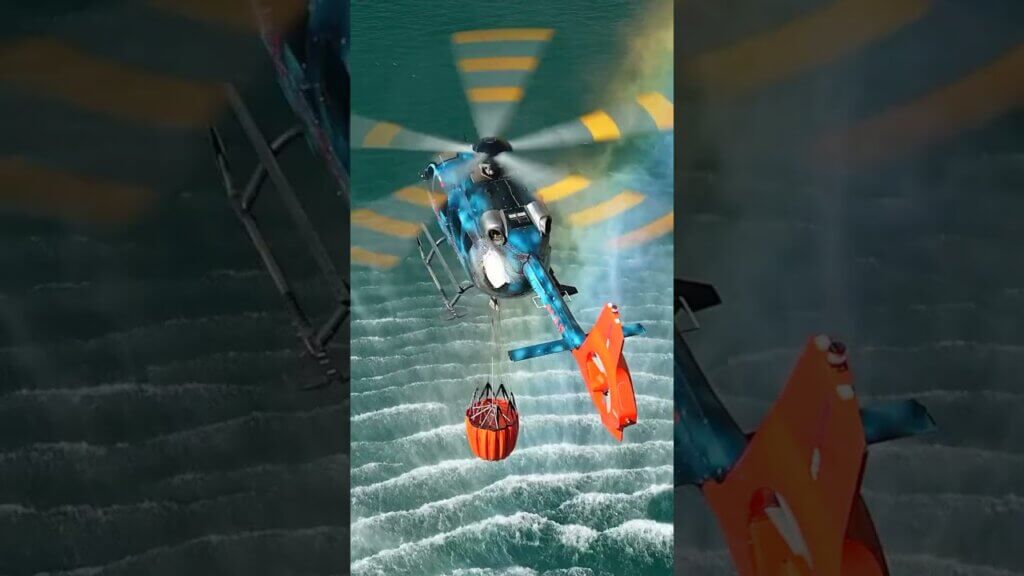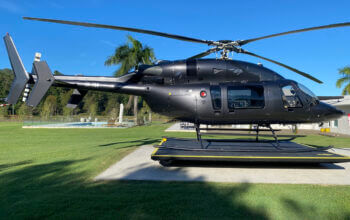After a tumultuous 18 months that saw its flamboyant chief executive exit the boardroom, MD Helicopters is for sale.
There is no definite timeline for a deal and no targeted buyers, but sole director Alan Carr told Vertical in a recent interview he is actively shopping the company around to all comers.
While he also focuses on cleaning up the company’s image with customers perturbed about a perceived lack of aftermarket support, Carr said his primary job is to “monetize” MD, though not to liquidate it.

Carr joined the company as sole director in April 2020, on the heels of CEO Lynn Tilton voluntarily resigning her position in late March. He was given the mandate to sell by the same bankruptcy court that ordered Tilton to sell MD and other troubled businesses to pay off Zohar funds, lenders that have sued her, as the Wall Street Journal reported last year.
“We have a complex ownership structure. That’s not a secret,” Carr said during a recent interview at a gunnery range the company leases to train foreign military pilots in West Texas. “I was brought in to sort of keep this together and ideally grow it and stabilize it while we figure that part of it out. The company probably will be for sale at some point soon. It’s not going to be a break-up. MD is going to be MD, just who owns it may change.”
A former lawyer, Carr worked as an investor in U.S. and European industrial companies for a decade before landing at MD as sole director. His previous firm handled the bankruptcies of Air Canada, United and Delta Airlines, he said.
“Because this is bankrupt-adjacent, that’s where I come in, but I don’t see that this is a company that needs to go bankrupt,” Carr said. “We have liquidity. We’re current with all the vendors. Things are getting better, not worse, since I’ve gotten here.”
When a sale could happen is not clear and there is no definite timeline for it, but Carr said it will likely happen “soon.”
“To me, the important thing for this business is to let the people who run this business every day run it, and do it well,” Carr said, adding that his intention is to “quarterback” executives who have more institutional knowledge while they run the day-to-day operation.
To that end, Carr established an executive committee to “act as a CEO-lite” that reports to him. The company does not have a traditional CEO and Carr admits the ownership structure is complicated.
Aside from the possibility that a large aerospace firm could buy MD outright, other possible buyers include strategic equity firms or a private equity firm like Patriarch Partners, which was founded by Tilton. (Tilton, through two of her wholly owned investment vehicles, remains the single largest shareholder of MD, her attorney told Vertical.)
“Maybe not somebody like a Boeing or Airbus, but someone who wants to vertically integrate within the sector,” Carr said. “We’ll talk to anybody. Maybe they’re heavy into the defense sector. Maybe they want to do more commercial. Maybe they make engines. Maybe they make rotors. I don’t know where it would be in that chain, but you could see an OEM and a manufacturer right together.”
“That said, from my perspective, MD is going to be around for a long time,” Carr added. “There is a very loyal following to the brand. I’ve spent some time in small rotary-wing aircraft and there’s nothing as exciting as an MD, the agility. It’s like the Ferrari of the class as opposed to a Cadillac.”
MD’s business is fairly segregated into two large camps: foreign military sales (FMS) through the U.S. government and commercial sales to various operators in the EMS, law enforcement, public utility and other sectors.
“That sort of comes as needed,” Carr said of the military side. “That business is steady and has been the heart of the business for the last five years. But you can’t sell the same thing to utilities or EMS.”

Carr says the commercial side of the business is ripe for growth, an area “you can push into, as opposed to getting pulled into when there is a military need; where they call you.”
“You really have to create your opportunities on the commercial side,” he said. “That what, with Mark Brodeur on that side, we’ve really been building it up and have had some really good wins. That’s what’s kept manufacturing going the last year or 18 months, which was less of a focus on the company because we have this big contract with all these” foreign militaries.
Military matters
The jewel at the heart of MD’s military business is an indefinite quantity, indefinite delivery contract to supply U.S. allied militaries with 500-series aircraft. At the heart of that deal is a fleet of 60 MD 530F attack helicopters the U.S. government bought for the Afghan Air Force. The remainder of the authorized 150 MD 530F Cayuse Warrior and/or MD 530G helicopters are up for grabs to U.S. allies deemed worthy through the foreign military sales process.
Afghanistan was authorized, through the U.S. government, to field a fleet of 60 MD 530s. With 50 delivered as of July and more on the way from the factory when Carr and Vertical sat down, the company fulfilled its initial obligation, but likely has missed out on future maintenance and repair business there as many of those helicopters are now in the hands of the Taliban.

Still, the contract remains in effect and several other countries such as Lebanon and Malaysia have signed on to buy MD 530s and train their pilots in the U.S. under the auspices of MD instructor pilots.
“I feel pretty confident there will be more orders from that,” Carr said. “FMS tend to be bulkier orders. They come lumpy and then you work them off. From a commercial standpoint, that’s a steady rate and you can just keep growing that. To me, there’s really no limit to what that can be. There’s really no perfect balance.”
Parts problems
Carr emphasized that part of his mission was to stabilize the company and boost its image with existing commercial customers, who have complained of lax customer service and interminable waits for spare parts in recent years.
MD rated dead last in Vertical’s 2021 Helicopter and Engine Manufacturers Survey, available in the July issue. Not for the first time did the company rank at the bottom of all measurements of customer satisfaction, with customers complaining of waiting 18 months for some parts and through-the-roof pricing.
Carr said the 2020 survey — in which it hit rock bottom — was a “call to action.” When the results of the most recent Vertical OEM survey were published, Carr said he immediately established a task force to identify the “root causes of the issues.”
“We’ve made a lot of progress on that,” he said. “It’s not going to be obvious to the customer immediately, but we’re already seeing some incremental improvements. It’s going to take some time to steer that, but we’re focusing daily on that.”
Most of the spare parts that caused customer headaches come from third-party manufacturers, Carr said. Without placing blame down the supply chain, Carr said MD is trying to improve its communication with customers about lead times for certain critical parts and “managing expectations” for other services.
“Obviously Covid adds further complications because it got worse,” Carr said. “Even when we started this past summer, the supply chain wasn’t as bad as it is now. There was stuff in the pipeline such that you weren’t seeing problems on a global basis. Now you’re really seeing everything slow down.”
“I think right now, everybody has a bit of an understanding that anything you order will take longer than expected, but we certainly had that issue in the past and we didn’t communicate well, and we know that,” he added. “We’re figuring out how to better get in touch with customers to say ‘We got your order. Here’s the situation. Here’s how long it will take. We aren’t ignoring you and here’s our plan to get it to you and keep you posted.’”

Carr recognizes that customers have had unpleasant experiences with MD service reps in the past and promised a renewed focus on old-fashioned, one-on-one support. He lamented the subpar communication between company and customer reported in surveys and vowed to buoy the aftermarket relationships MD has with operators.
“We want customers to look forward to speaking to their service rep, who look forward to speaking to the customers, and communicate,” Carr said. “If you order a couch and it doesn’t show up when it’s supposed to, but they call a week before and tell you the truck broke down and it’s going to be two more weeks, you’re going to be OK with that. But if they don’t say anything and they don’t return your calls, you’re going to be pretty irritated.”
Keeping multiple units of every part and component on hand to ship out at a moment’s notice is prohibitively expensive, so customers can expect to wait for items like rotors and engines that require skilled and complex manufacturing. Still, when MD makes promises on behalf of its supply base, those third-party component manufacturers will have to deliver and their feet will be held to the fire, Carr said. If the company needs to source new third-party vendors to deliver parts on time, “we’ll do that,” he said.
“It’s upon us to talk the talk and now we’ve got to walk the walk,” Carr said. “I think we’re beginning to walk.”
This story has been updated to reflect comments by an attorney for Lynn Tilton.










MD Helicopters, there is no substitute.
Not a surprise, given that MD 530F sales to the Afghan military had kept MDHI afloat for the past decade.
Great copters..company must be saved